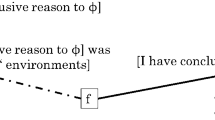Abstract
We aim to develop a form of debunking argument according to which an agent’s belief is undermined if the reasons she gives in support of her belief are best explained as rationalizations. This approach is a more sophisticated form of what Shaun Nichols has called best-explanation debunking, which he contrasts with process debunking, i.e., debunking by means of showing that a belief has been generated by an epistemically defective process. In order to develop our approach, we identify an example of such a best-explanation debunking argument in Joshua Greene’s attack on deontology. After showing that this argument is not an instance of process debunking, we offer our best-explanation approach as a generalization of Greene’s argument. Finally, we defend our approach by showing that it is not susceptible to some criticisms that Nichols has leveled against a less sophisticated form of best-explanation debunking.

Similar content being viewed by others
Notes
See Lipton (2004) for an in-depth treatment of this issue.
4 To take one example, Berker (2009, pp. 315–316) admittedly finds it difficult to determine which arguments Greene is making.
Strictly speaking, the targets of debunking arguments are beliefs. However, in what follows, we’ll talk of debunking judgments and theories. And we’ll take it as understood that judgments are a particular kind of belief, and that talk of debunking theories is short for debunking beliefs that are either about theories, or that are generated by theories.
Similar evolutionary debunking arguments have been put forward by Joyce (2001, 2006), Rosenberg (2011), Ruse (1986), and Street (2006), among others. Most of these authors claim that discovering the evolutionary history of the processes that produce moral judgments undermines all moral judgments, or at least those that presuppose some mind-independent moral truth. In contrast, Greene targets only characteristically deontological judgments.
See Gervais (2015) for an up-to-date account of the debate.
There are a number of ways to make this idea more precise. For example, one might claim that the justificatory status of a belief is lowered in proportion to the extent to which E is a better explanation of why A holds B than SR is, and to the extent to which E and SR are unrelated.
References
Berker, S. 2009. The normative insignificance of neuroscience. Philosophy & Public Affairs 37(4): 293–329.
BonJour, L. 1980. Externalist theories of empirical knowledge. Midwest Studies in Philosophy 5: 53–73.
Conee, E., and R. Feldman. 2001. Internalism defended. American Philosophical Quarterly 38(1): 1–18.
Dean, R. 2010. Does neuroscience undermine deontological theory? Neuroethics 3(1): 43–60.
Foot, P. 1967. The problem of abortion and the doctrine of double effect. Oxford Review 5: 5–15.
Gervais, R. 2015. Mechanistic and non-mechanistic varieties of dynamical models in cognitive science: Explanatory power, understanding, and the ‘mere description’ worry. Synthese 192(1): 43–66.
Goldman, A. 1999. Internalism exposed. Journal of Philosophy 96(6): 271–293.
Greene, J.D. 2008. The secret joke of Kant’s soul. In Moral psychology, vol. 3: The neuroscience of morality: Emotion, disease, and development, ed. Sinnott-Armstrong W., 35–79. Cambridge, MIT Press.
Greene, J.D. 2014. Beyond point-and-shoot morality: Why cognitive (neuro)science matters for ethics. Ethics 124(4): 695–726.
Greene, J.D., R.B. Sommerville, L.E. Nystrom, J.M. Darley, and J.D Cohen. 2001. An fMRI investigation of emotional engagement in moral judgment. Science 293(5537): 2105–2108.
Joyce, R. 2001. The myth of morality. Cambridge: Cambridge University Press.
Joyce, R. 2006. The evolution of morality. Cambridge: MIT Press.
Kahane, G., and N. Shackel. 2010. Methodological issues in the neuroscience of moral judgement. Mind & Language 25(5): 561–582.
Kornblith, H. 1999. Distrusting reason. Midwest Studies in Philosophy 23: 181–196.
Lavoisier, A.L. 1965/1789. Elements of chemistry. New York: Dover.
Leben, D. 2014. When psychology undermines belief. Philosophical Psychology 27(3): 328–350.
Lipton, P. 2004. Inference to the best explanation, 2nd edn. London: Routledge.
Nichols, S. 2014. Process debunking and ethics. Ethics 124(4): 727–749.
Rosenberg, A. 2011. The atheist’s guide to reality: Enjoying life without illusions. New York: W. W. Norton & Company.
Ruse, M. 1986. Taking Darwin seriously: A naturalistic approach to philosophy. New York: Oxford University Press.
Schwitzgebel, E., and J. Ellis. 2017. Rationalization in moral and philosophical thought. In Moral Inferences, eds. Bonnefon J.-F. and Trémolière B., 170–190. New York, Routledge Psychology Press.
Sinnott-Armstrong, W. 2008. Framing moral intuitions. In Moral psychology, vol. 2: The cognitive Science of morality: Intuition and diversity, ed. Sinnott-Armstrong W., 47–76. Cambridge, MIT Press.
Steup, M. 1999. A defense of internalism. In The theory of knowledge: Classical and contemporary readings, 2nd ed., ed. Pojman L., 373–384. Belmont, Wadsworth Publishing.
Sosa, E. 2003. Beyond internal foundations to external virtues. In Epistemic justification: Internalism vs. externalism, foundations vs. virtues, eds. BonJour L. and Sosa E., 97–170. Malden, Blackwell.
Street, S. 2006. A Darwinian dilemma for realist theories of value. Philosophical Studies 127(1): 109–166.
Tersman, F. 2008. The reliability of moral intuitions: a challenge from neuroscience. Australasian Journal of Philosophy 86(3): 389–405.
Thomson, J.J. 1976. Killing, letting die, and the trolley problem. The Monist 59(2): 204–217.
Thomson, J.J. 1985. The trolley problem. The Yale Law Journal 94 (6): 1395–1415.
Acknowledgements
We presented an earlier draft of this material at the Institute of European and American Studies at Academia Sinica. Thanks to the audience there, and especially to Tzu-wei Hung, Ellie Hua Wang, Terence Hua Tai, and Norman Y. Teng for helpful questions and comments. Thanks also to two anonymous reviewers for their helpful suggestions. Much of the work for this paper was completed during Hricko’s time as a postdoctoral fellow in the Institute of European and American Studies at Academia Sinica, and so he would like to thank the Institute, and especially his sponsor Jih-Ching Ho.
Author information
Authors and Affiliations
Corresponding author
Rights and permissions
About this article
Cite this article
Hricko, J., Leben, D. In Defense of Best-Explanation Debunking Arguments in Moral Philosophy. Rev.Phil.Psych. 9, 143–160 (2018). https://doi.org/10.1007/s13164-017-0341-8
Published:
Issue Date:
DOI: https://doi.org/10.1007/s13164-017-0341-8



